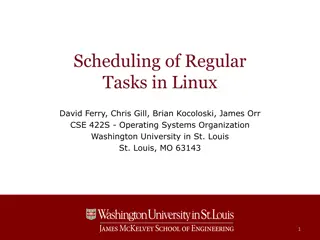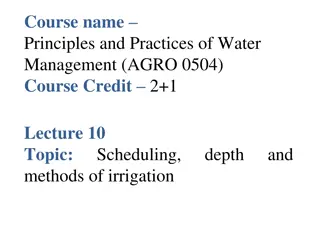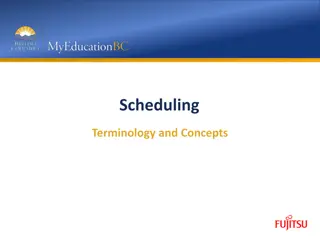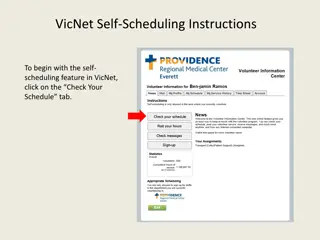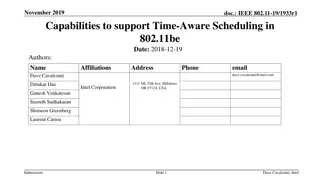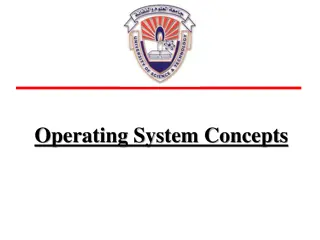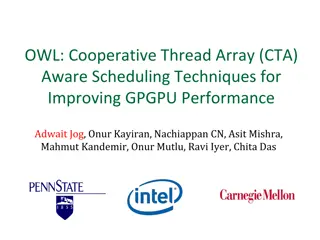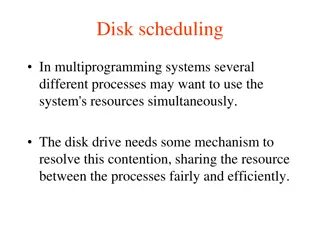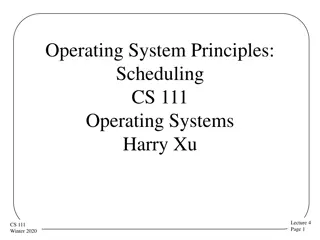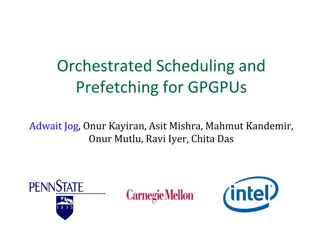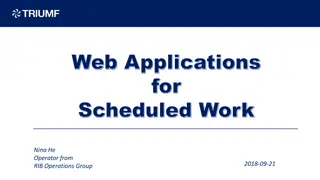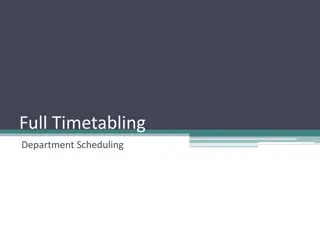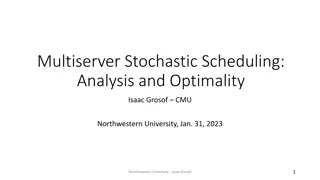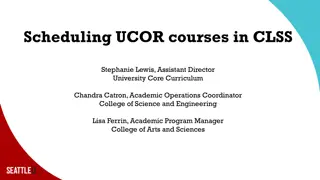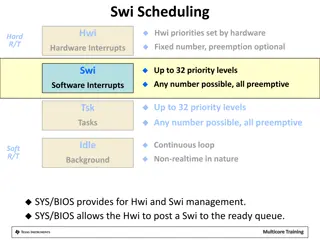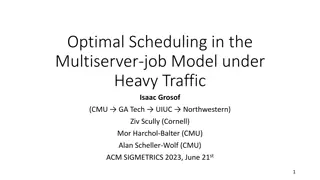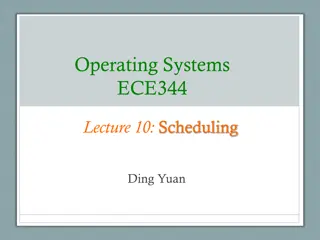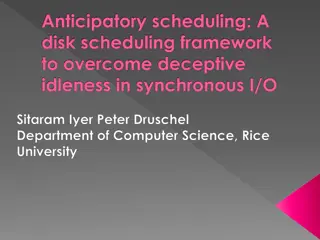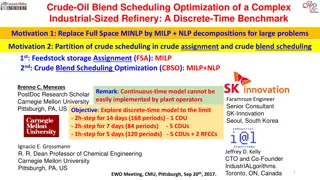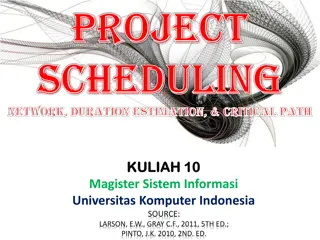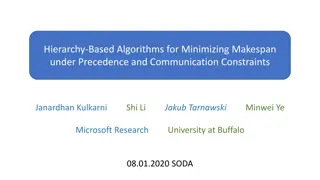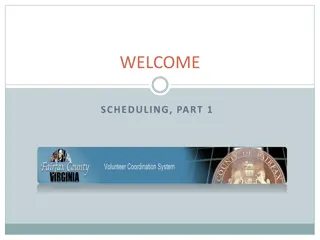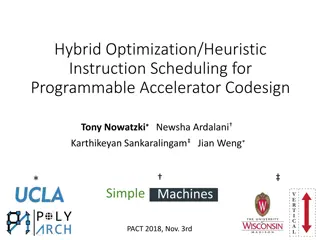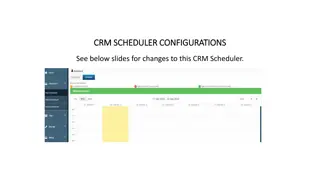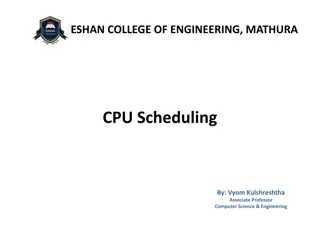Enhancing Student Success through Block Scheduling at KSU
National Institute for Student Success (NISS) diagnostic analysis at KSU shows the importance of block scheduling in increasing graduation rates and student engagement. Actions to increase registration for full-time schedules and improve student success are underway. The goals of KSU's block schedul
0 views • 10 slides
Understanding Linux Process Scheduling and Priorities
Delve into the intricacies of process scheduling in Linux systems, covering topics such as task prioritization, process states, scheduler decisions, and important scheduling scenarios. Learn about traditional scheduling concerns like throughput and latency, as well as different types of workloads su
1 views • 19 slides
Understanding Irrigation Scheduling for Optimal Crop Yield
Scientific irrigation scheduling plays a vital role in determining the correct timing and quantity of water application for crops to enhance yields efficiently while preserving soil quality. Various criteria are utilized in irrigation scheduling, such as potential evapotranspiration (PET) estimation
12 views • 58 slides
Enhanced Scheduling Method for Low Latency Traffic in IEEE 802.11-24/0091r1
This document presents an enhanced scheduling method for handling low latency traffic in IEEE 802.11 networks. It focuses on supporting deterministic and event-based latency-sensitive traffic, addressing challenges in scheduling and resource allocation. The proposed method aims to improve the reliab
8 views • 12 slides
Understanding Scheduling Terminology and Concepts in MyEdBC
Explore the key terminology and concepts related to scheduling in MyEdBC, including the Build view, scenarios, flat and rotated schedules, patterns, and base terms. Get insights into setting up scheduling structures and preferences, as well as managing course requests and staff information. Enhance
1 views • 13 slides
VicNet Self-Scheduling Instructions
Begin using the self-scheduling feature in VicNet by following step-by-step instructions, such as checking available shifts, selecting a day to volunteer, viewing specific times, scheduling yourself, and managing your shifts. Contact Volunteer Services for additional help or questions.
1 views • 6 slides
GPU Scheduling Strategies: Maximizing Performance with Cache-Conscious Wavefront Scheduling
Explore GPU scheduling strategies including Loose Round Robin (LRR) for maximizing performance by efficiently managing warps, Cache-Conscious Wavefront Scheduling for improved cache utilization, and Greedy-then-oldest (GTO) scheduling to enhance cache locality. Learn how these techniques optimize GP
0 views • 21 slides
Time-Aware Scheduling Capabilities in IEEE 802.11be
Describing necessary enhancements to enable Time-Aware Scheduling in IEEE 802.11be for time-sensitive applications. The focus is on aligning with the 802.1Qbv standard to address latency, jitter, and reliability issues, presenting a structured outline of requirements and configurations essential for
0 views • 24 slides
Understanding Scheduling Algorithms in Operating Systems
Exploring the world of scheduling in operating systems, this content covers various aspects such as introduction to scheduling, process behavior, bursts of CPU usage, CPU-bound and I/O-bound processes, when to schedule processes, and the differences between non-preemptive and preemptive scheduling a
0 views • 34 slides
Understanding CPU Scheduling in Operating Systems
In a single-processor system, processes take turns running on the CPU. The goal of multiprogramming is to keep the CPU busy at all times. CPU scheduling relies on the alternating CPU and I/O burst cycles of processes. The CPU scheduler selects processes from the ready queue to execute when the CPU i
0 views • 26 slides
Greedy Method for Task Scheduling Problems
The greedy method is a powerful algorithm design technique used in solving various optimization problems. In the context of task scheduling, we explore two specific problems: minimizing the number of machines needed to complete all tasks and maximizing the number of non-overlapping intervals on a si
1 views • 58 slides
Improving GPGPU Performance with Cooperative Thread Array Scheduling Techniques
Limited DRAM bandwidth poses a critical bottleneck in GPU performance, necessitating a comprehensive scheduling policy to reduce cache miss rates, enhance DRAM bandwidth, and improve latency hiding for GPUs. The CTA-aware scheduling techniques presented address these challenges by optimizing resourc
0 views • 33 slides
Simplifying Residency Shift Scheduling with Mathematical Programming Techniques
This project, led by Professor Amy Cohn and William Pozehl, aims to demonstrate how mathematical programming techniques can simplify the complex task of residency shift scheduling. The Residency Shift Scheduling Game highlights the challenges of manual scheduling and the ease of using mathematical p
1 views • 37 slides
Understanding Disk Scheduling in Multiprogramming Systems
In a multiprogramming system, several processes may contend for disk resources. Disk scheduling aims to efficiently share the disk drive's resources among processes, maximizing I/O request satisfaction while minimizing head movement. Various disk scheduling policies like FCFS, SSTF, and SCAN aim to
1 views • 22 slides
Understanding Operating System Scheduling Principles
Operating system scheduling involves making decisions on resource allocation among multiple clients, determining who gets to use the resource next and for how long. Different scheduling algorithms aim to achieve specific goals, such as maximizing throughput, minimizing waiting time, ensuring fairnes
0 views • 57 slides
Orchestrated Scheduling and Prefetching for GPGPUs
This paper discusses the implementation of an orchestrated scheduling and prefetching mechanism for GPGPUs to enhance system performance by improving IPC and overall warp scheduling policies. It presents a prefetch-aware warp scheduler proposal aiming to make a simple prefetcher more capable, result
0 views • 46 slides
Evolution of Shift Work Scheduling at an Accelerator Facility
Operators at an accelerator facility used to rely on manual processes and multiple systems for shift work scheduling and timesheet management. With the implementation of new interactive applications, the process has been streamlined, allowing for better planning, efficient submission of timesheets,
0 views • 32 slides
Efficient Department Scheduling for Timetabling Success
Efficient timetabling for a department involves various stages like data entry, draft timetable creation, feedback collection, production of the final timetable, schedule adjustments, and publication. Key information needed includes faculty availability, room inventory, specific scheduling parameter
0 views • 59 slides
Multiserver Stochastic Scheduling Analysis
This presentation delves into the analysis and optimality of multiserver stochastic scheduling, focusing on the theory of large-scale computing systems, queueing theory, and prior work on single-server and multiserver scheduling. It explores optimizing response time and resource efficiency in modern
0 views • 38 slides
Effective UCOR Course Scheduling Strategies
This resource provides specific instructions, tips, and reminders for scheduling UCOR courses in CLSS. Learn about approved titles, using the CLSS heat map, cross-listing steps, workflow tips, deadlines, and more. Access CLSS and UCOR resources, including training materials, production calendars, an
0 views • 13 slides
Real-Time Interrupt Handling and Scheduling in SYS/BIOS
This content covers the management of hardware and software interrupts, interrupt priorities, scheduling rules, and execution flow for real-time systems using SYS/BIOS. It discusses the handling of interrupts by the Hardware Interrupt (Hwi) and Software Interrupt (Swi) components, priority levels, p
0 views • 4 slides
New Scheduling Policy: ServerFilling-SRPT in Multiserver Job Model
Discusses a new scheduling policy, ServerFilling-SRPT, designed to favor small jobs in the multiserver job model. The policy aims to minimize mean response time by prioritizing jobs with the least remaining size order and arranging them based on server needs. The approach involves finding minimal su
0 views • 16 slides
Understanding Scheduling in Operating Systems: A Comprehensive Overview
This content delves into the intricate details of scheduling in operating systems, covering the goals, various scheduling algorithms, multiprogramming concepts, decision-making processes for resource allocation, timing considerations, scheduling objectives, and performance criteria such as throughpu
0 views • 42 slides
Overcoming Deceptive Idleness with Anticipatory Scheduling
Addressing the issue of deceptive idleness in disk scheduling by implementing an anticipatory scheduling framework that leverages prefetching and anticipation core logic. This framework enhances the efficiency of handling synchronous I/O processes to prevent premature decision-making by the schedule
0 views • 21 slides
Kronos Exercise Guides for Scheduling Managers
Dive into the world of Kronos Exercise Guides for Scheduling Managers, where you can attempt exercises to enhance your skills. Use the provided solutions to track your progress and learn hands-on through specific examples. From creating hyperfinds to resolving timecard exceptions, this guide offers
0 views • 43 slides
Understanding Greedy Algorithms in Interval Scheduling
Interval Scheduling is a classic algorithmic problem where the goal is to schedule a set of tasks to maximize efficiency without overlap. Greedy algorithms play a crucial role in solving this problem by making locally optimal choices at each step. The concept of greediness, building the solution ste
0 views • 24 slides
College of Medicine M4 Scheduling Information for Class of 2021
Important scheduling timeline information for 4th-year medical students at the College of Medicine. Key dates include deadlines for hardship requests, core clerkship preferences, Geriatrics/Palliative Medicine enrollment, scheduling rounds, and publication rules. Compliance with specific requirement
0 views • 8 slides
Exploring Dynamic Programming Concepts in Job Scheduling
Delve into the world of dynamic programming by examining the application of segmented least squares, knapsack problems, and job scheduling optimization. Discover the challenges of finding optimal solutions and explore different strategies to address complex scheduling scenarios efficiently.
0 views • 28 slides
Optimization of Crude Oil Blend Scheduling in Industrial Refineries
Explore a discrete-time model for scheduling optimization in a complex industrial-sized refinery, focusing on feedstock storage assignment and crude blend scheduling. The objective is to study various time steps and unit configurations to maximize efficiency and productivity. Various benchmarks and
0 views • 10 slides
Comprehensive Guide to Project Scheduling and Network Terminology
Understand the key concepts of project scheduling, network terminology, and IT networking with insights into critical paths, activities, and event sequencing. Discover the importance of establishing business networks and how project networks aid in planning, scheduling, and monitoring project progre
0 views • 32 slides
Hierarchy-Based Algorithms for Minimizing Makespan under Precedence and Communication Constraints
This research discusses hierarchy-based algorithms for minimizing makespan in scheduling problems with precedence and communication constraints. Various approximation techniques, open questions in scheduling theory, and QPTAS for different settings are explored, including the possibility of beating
0 views • 25 slides
Improving Job Scheduling with Nudge Policy
Explore the innovative Nudge policy for stochastic improvement upon First-Come-First-Served (FCFS) scheduling. The Nudge policy introduces a new approach with better performance tradeoffs compared to traditional scheduling methods. Discover how Nudge outperforms FCFS across various job size distribu
0 views • 21 slides
Job Scheduling Across Geo-distributed Datacenters
Scheduling jobs across geo-distributed datacenters poses challenges such as optimizing job completion time, reducing data transfer costs, and coordinating tasks across multiple locations. Various strategies like reordering-based approaches and scheduling heuristics are explored to enhance job schedu
0 views • 32 slides
Enhancing Appointment Scheduling and Caseload Management
Improve your appointment scheduling process and manage your caseload effectively with the help of actionable plans and reports. Learn how to use TWIST reports for planning appointments, assessing caseload needs, and maximizing show rates. Utilize Transaction Report, Projected Individual Appointment
0 views • 12 slides
Insights into Volunteer Scheduling and Management
Exploring the intricacies of volunteer scheduling, this informative guide covers topics such as creating schedule slots, weighing the pros and cons of scheduling, opportunity scheduling, monthly calendars, slot summaries, volunteer and opportunity listings, and more. Dive into the world of volunteer
0 views • 21 slides
Hybrid Optimization Heuristic Instruction Scheduling for Accelerator Codesign
This research presents a hybrid optimization heuristic approach for efficient instruction scheduling in programmable accelerator codesign. It discusses Google's TPU architecture, problem-solving strategies, and computation graph mapping, routing, and timing optimizations. The technique overview high
0 views • 33 slides
University Space Scheduling Guidelines
University space scheduling guidelines prioritize academic courses and campus use, emphasizing the need for more available space. The policy outlines expectations, scheduling guidelines, and the management of laboratory and studio spaces. It also addresses the direct scheduling of such spaces for sp
0 views • 14 slides
Customizable CRM Scheduler with Appointment Calendar for Clients
Implement a customizable CRM scheduler with a user-friendly appointment calendar for clients and customers. Allow easy scheduling, cost estimates, demographic data collection, and communication features. Enhance the scheduler with new event types, break time configuration, appointment types, and not
0 views • 9 slides
Understanding CPU Scheduling Concepts at Eshan College of Engineering, Mathura
Dive into the world of CPU scheduling at Eshan College of Engineering in Mathura with Associate Professor Vyom Kulshreshtha. Explore topics such as CPU utilization, I/O burst cycles, CPU burst distribution, and more. Learn about the CPU scheduler, dispatcher module, scheduling criteria, and the impl
0 views • 18 slides
Overview of Project Scheduling in Engineering Management
The lecture covers planning and scheduling in engineering management, focusing on activity and event scheduling techniques, bar charts, critical path analysis, and addressing project scheduling principles. It discusses the objectives of the lecture, the difference between planning and scheduling, th
0 views • 29 slides

